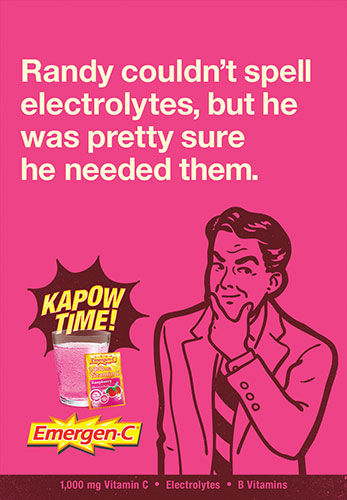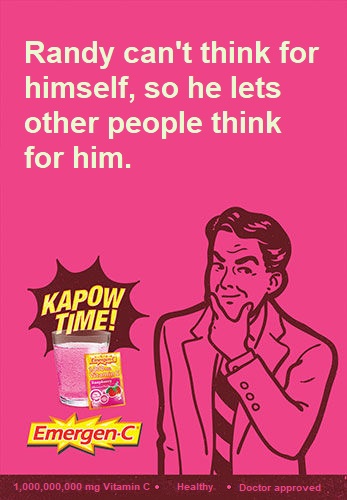Welcome to UBC Blogs. This is your first post. Edit or delete it, then start blogging!
Monthly Archives: October 2019
GRSJ 300: Culture Jam

The original ad is from a company called “Emergen-C” which sells all sorts of supplements but they primarily include Vitamin C in their products. They created a new line of advertisements in canada (skytrains and transit) to market these supplements for “germaphobes”. However most of these ads are just playing on people’s innate fear to become sick. The one I chose out of the other advertisements in this line up ironically demonstrates that Randy (the consumer) would rather believe in the claims of a company rather than doing his own research about how people actually get sick. Instead of falling for predatory marketing he could wash his hands, eat a healthy diet and exercise. Alacer Corporation (parent company of Emergen-C) is not a very credible company but still has garnered a lot of consumers through a myths in the past that claims that Vitamin C can cure ailments such as the common cold. There is also evidence refuting these myths stating that large doses of Vitamin C doesn’t appear to prevent colds. It so happens that in 2013 a class action lawsuit was filed against Alacer Corporation because there was no evidence against the claims they made with their products. The main problem with this ad is that consumers put too much faith in corporations to make decisions for them, tell them what’s right/wrong and blindly believe in claims the company puts forth. This is especially prevalent in the “health” based supplement industry where a lot of grandiose claims can be made which consumers buy into and maybe due to the placebo effect these companies continue to exist to deceive even more consumers.

My jamming philosophy was to keep the inherent style of the advertisement intact so I could exaggerate how absurd Randy’s thinking was. From the original text Randy mentions how “he was pretty sure he needed them” (electrolytes) which presents Randy as an uninformed consumer but also a gullible one. From the ad it seems like Randy was ready to purchase the product for no good reason. So to exaggerate his thinking I changed the text to include “Randy can’t think for himself”. I further included “so he lets other people think for him” because by falling prey to the marketing scheme he essentially lets the company and it’s motivations (make more sales) direct his decisions.
Another alteration I made was to the bottom texts in the original ad highlighting some facts about what is in the actual product. Instead I included “1,000,000,000 mg of Vitamin C” to exaggerate the fact that consumers really like when there is more of a product. They are drawn to it because it feels like they duped the company by getting more for their money. However the company knows this and uses it as a marketing tactic to get consumers to buy their product. Another way they achieve this is to put buzzwords that people have heard from other media sources which have specific connotations pertaining to health and wellness. We see this in the original ad when it says electrolytes and B vitamins. If someone really needed this product they would know how much of these electrolytes and B vitamins they would need so by just claiming that they have these in their product it’s only use is to use it as health jargon. So instead I replaced it with a generic, “healthy” and “doctor approved” to show how their underlying message to consumers is very simple.
Resources:
Image: https://cdn.trendhunterstatic.com/phpthumbnails/298/298944/298944_6_600.jpeg